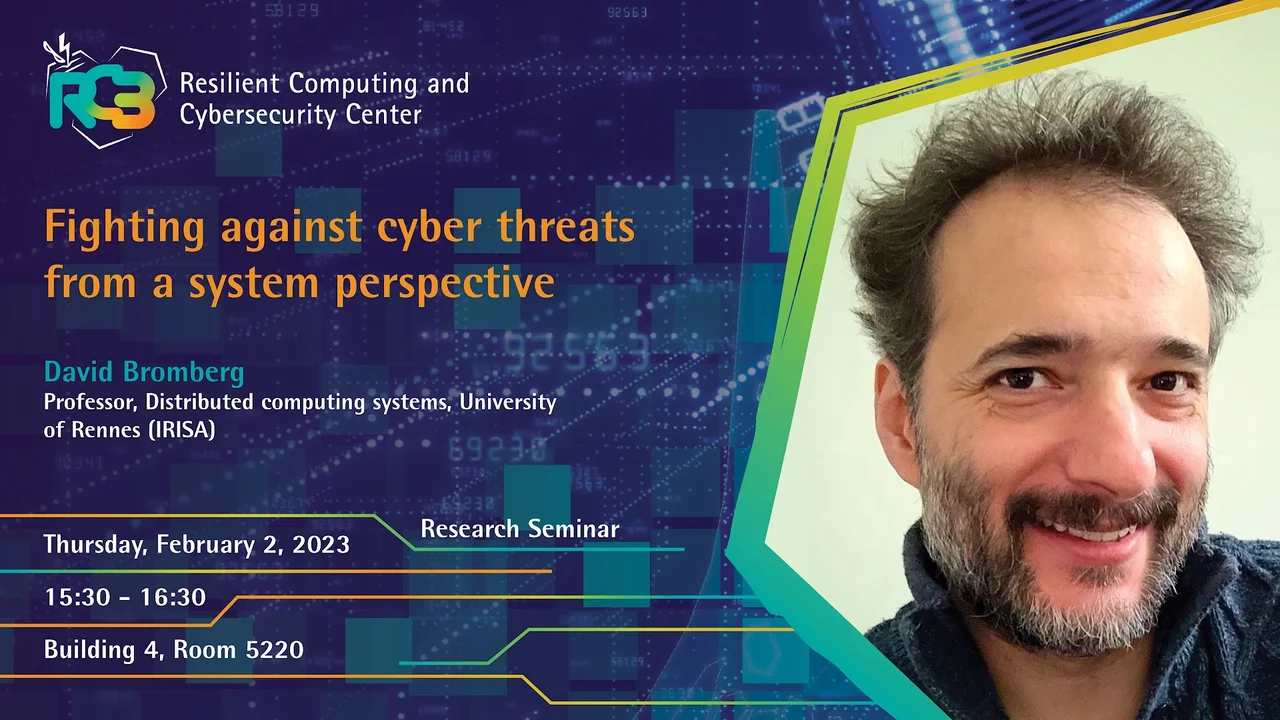
Fighting against cyber threats from a system perspective
- Prof. David Bromberg, Distributed computing systems, University of Rennes (IRISA)
B4 L5 R5220.
In this talk we will explore how research in systems and distributed systems may improve the resilience to cyber attacks following 3 axes targeting mobile systems, distributed systems, and operating systems
Overview
Abstract
Cyber attacks have now invaded our daily lives. According to a report by the European police agency Europol, cybercrime threats are exploding in Europe. Not a day goes by without discovering that an institution or a company has been attacked. In this talk we will explore how research in systems and distributed systems may improve the resilience to cyber attacks following 3 axes targeting mobile systems, distributed systems, and operating systems; (I) The astonishingly widespread adoption of the Android operating system has been accompanied by the spread of malware across the Android ecosystem at an alarming rate leading to study how to strengthen the robustness of mobile systems such as Android; (II) Peer sampling is a key component of distributed systems for overlay management and information dissemination. It is regularly challenged by Byzantine nodes, leading to a revisiting of the field by introducing new algorithms and investigating how SGX hardware enclaves can improve resilience to threats. (III) A significant amount of research focuses on defending against cyber attacks such as ransomware but little on getting systems back up and running once they have been attacked. We explore how to improve operating systems with fast execution recovery.
Brief Biography
David Bromberg is a professor in distributed computing systems at the University of Rennes (IRISA) since 2015. He heads both the computer science department at the Engineering School of Rennes (ESIR), and the large-scale systems department at the computer science research laboratory of Rennes (IRISA). He is one of the initiators and leaders of the Inria national challenge on systems research, which started in 2022, and whose objective is to federate the dispersed actors in systems in order to revive and promote research on operating systems in France. In the same vein, he was the general chair of Eurosys'22 which was held in person in Rennes to revitalize system research in Europe after two years of pandemics and virtual editions. Further, David is also strongly involved in the promotion of research in Computer Science in Africa via its INRIA associated team with Cameroon which he has been leading since 2021. Previously, he was an associate professor at the University of Bordeaux, and a member of the LaBRI software engineering research that he led from 2013 to 2015.
His main interests are in scalability and programmability of complex distributed systems (e.g., overlays), software engineering applied to systems, distributed systems, systems and network programming. These last years, David has operated a shift to promote and focus on cyber security from a system perspective.
David is the author of over 40 peer-reviewed publications, and has regularly accepted papers at SRDS, DSN, ICDCS, Middleware, Percom, Infocom, NSDI. He has served on a number of program committees in his field. In particular, he was a member of the program committee for many years at the ACM/IFIP/USENIX International Conference on Middleware, and ultimately at Usenix NSDI for 2024.
